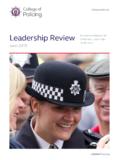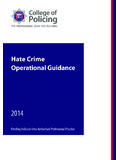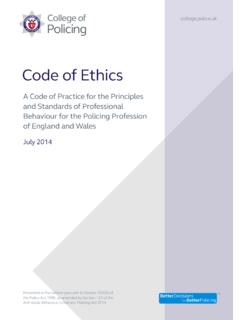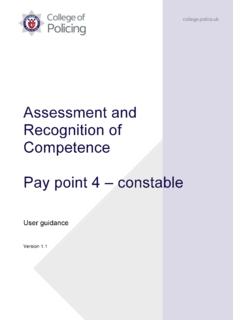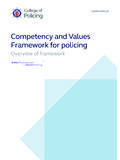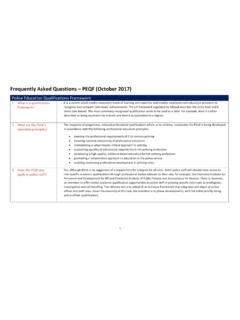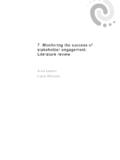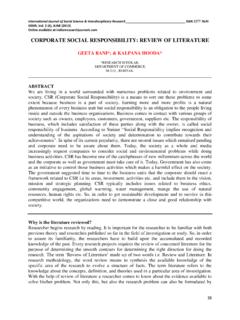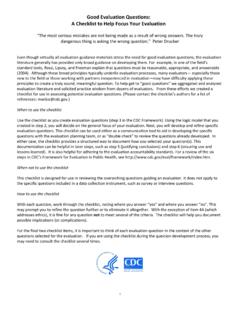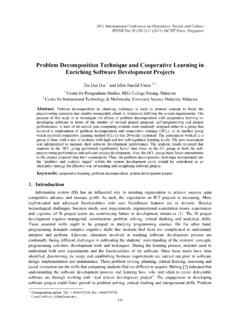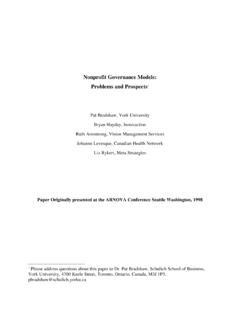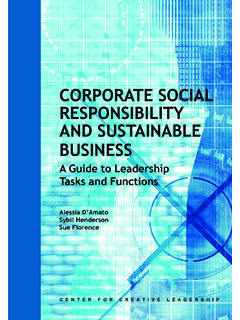Transcription of Leadership Review - college.police.uk
1 ReviewInterim report 20 March 2015 College of Policing23 Leadership Review : Interim reportLeadership Review : Interim reportCollege of Why do we need a Review ? Our police service is the envy of many around the world, respected for its strength of purpose and public service ethos. Leaders at all levels of the police can be proud of a tradition of success in handling challenging incidents on a daily basis. The police service has managed stringent budget reductions while also adapting to new developments in political accountability, patterns of crime and in the task of protecting the public. Yet there is a powerful need for change. The future context identified in this Review demands a fundamental change in the way we equip the whole police workforce with Leadership skills and knowledge. Only by being highly adaptable, extraordinarily effective and operating from the basis of a knowledge of what works will policing maintain its reputation and continue delivering on its commitment to protect the safety and liberty of all citizens.
2 A failure to adapt and prepare for the future means there is a serious risk that the police service will falter under twin pressures of financial constraint and declining Debate has been mounting in recent years about the structure, status and culture of policing, and many efforts have been made to identify ways to support all those working in the police to fulfil their duties while adapting to new social, economic and political realities. These efforts have met with, at best, partial success. This is not due to failures of intent, diligence or commitment. Rather, they have foundered on the reality that consistent cultural and structural reform is one of the most difficult things to achieve in any single organisation, let alone in the 43 locally based, independently funded and accountable forces which, together with non-geographical organisations, comprise policing in England and The benefit of embedding consistent, professional practice that is ethically based and informed by evidence has been articulated many times.
3 That it remains an unfulfilled goal for UK policing is in part because we still wrestle with conflicting images of policing as a profession, and as a craft: The Job . However, with the establishment of the College of Policing as the professional body, the introduction of a consistently adopted Code of Ethics, and the imperative of keeping up with external change, the opportunity to make progress towards this goal is greater than The risks arising from not making progress are also greater than ever. The development of an ethical, evidence-based police profession must be applied at all levels and especially to the practice of Leadership . Not doing so will result in a failure to unlock the full potential of those working in policing that will, in turn, inhibit the police service s ability to meet the challenges of the future or provide the best service possible to the Introduction 3 Why do we need a Review ? 3 What is the role of Leadership ? 4 Why is this Review the College of Policing s responsibility?
4 52. Methodology 6 Phases 6 Establishing the evidence base 6 Stakeholder engagement 8 Views from beyond policing 83. The future context for police Leadership 94. Implications for policing 125. Supporting police leaders 13 Improving culture 13 Recommendation 1: Existing police leaders should influence and drive the required culture change by demonstrating their own commitment to personal development and supporting the implementation of the Review . 16 Addressing unintended consequences of hierarchy 16 Recommendation 2: Review the rank and grading structures in policing across warranted and staff roles. 17 Increasing diversity and valuing difference 18 Recommendation 3: Embed the values articulated in the principles from the Code of Ethics in all local and national selection processes. 201 Recommendation 4: Provide a structure of entry, exit and re-entry points to allow for career flexibility.
5 24 Recommendation 5: Advertise all vacancies for recruitment and promotion nationally. 24 Giving attention to both management and Leadership development 24 Recommendation 6: Create a new model of Leadership and management training and development which is accessible to all within policing. 25 Recognising lateral development 26 Recommendation 7: Increase flexibility in assigning powers and legal authorities to staff. 28 Recommendation 8: Develop career opportunities which allow recognition and reward for advanced practitioners. 29 Achieving greater consistency of practice across forces 29 Recommendation 9: Introduce national standards for recruitment and promotion into all ranks and grades. 30 Recommendation 10: The Home Office should Review whether existing structures, powers and authorities in policing are sufficient to support consistent implementation of these recommendations.
6 316. Context for these recommendations 327. Appendices 33 College of Policing45 Leadership Review : Interim reportLeadership Review : Interim reportCollege of What is the role of Leadership ? Leadership is the quality which connects an understanding of what it is that must be done with the capability to achieve it. It is a term often misused by those who dispute its value, or by those convinced it is a panacea for all ills. Leadership is not the sole preserve of those in high-ranking roles, but a capability that can be instilled and developed at every level. Leadership in policing can be described in four dimensions: individual, operational, senior and organisational. At the individual level everyone working in policing needs Leadership attributes to be successful in their role. At the operational level, incident management and team effectiveness are critical. The task is different at a senior level, which is more strategic yet still requires elements of command.
7 Organisational Leadership involves the governance, executive and direction of a service at a systemic To build fit-for-purpose police Leadership in an evidence-based, ethical profession serving a diverse, democratic society, we must first identify desirable traits in an ideal police leader. Views provided to this Review suggest that the ideal police leader is driven by the core values of policing, open to challenge, quick to adapt; someone with an ability to understand and exploit the benefits of technology and good business practice. This is a leader who empowers, trusts and supports every individual to succeed among their peers, within their teams and across their organisations; who copes with the challenges of emerging crime and public safety issues; who values difference and diversity; and who readily accepts personal accountability while retaining the trust of communities. These are leaders who demonstrate resilience in responding and adapting to high pressure and complex situations, without compromising these other characteristics.
8 While no single Leadership style or model can be said to be the complete answer to future demands, a collective style of Leadership is found in many successful organisations. It is a style that places the leader in the role of an enabler, ultimately working to support the team. A more collective model of Leadership may shift power to all levels and improve two-way communication. Having described these qualities, we must guide leaders along changing career paths, recognising the need to get the best from people through appropriate support and accountability matched with realistic reward and recognition. This Review found investment in Leadership development to be patchy and, in financially challenging times, training in the intangible soft skills that are vital to Leadership can be the first to be cut, compared with the more quantifiable hard skills. Yet it is essential that we have the best possible Leadership if we are to navigate future demands successfully. A concern articulated by some is, what if you invest in developing your people and they leave?
9 To which the response must be, what if you don t invest in them and they stay? Why is this Review the College of Policing s responsibility? Leadership is a primary issue for a body establishing the elements of a formal profession. It sits at the heart of what it means to practise as a professional and it is the responsibility of a professional body to state what can be expected of leaders in that In its first year the College began to Review whether training and development for Leadership was being done as well as it might be given the changes affecting policing. The Review had begun to investigate the structures and outcomes of Leadership programmes and to devise what future Leadership training and development might look like. It became apparent that a fundamental Review of the future requirements of police Leadership was needed, and this was the mandate adopted following the Home Secretary s announcement of 22 July 2014. In conducting this Review the College has made use of the widest range of evidence available, in line with our commitment to embedding evidence-based practice.
10 Sources ranged from academic articles and trials to workforce data and surveys, and from engagement with external organisations to consultations with the police workforce. However, in many areas current evidence is at best partial. We must accept this reality while we continue to build the evidence base, and not be afraid of basing judgements on the best available The vision of the College of Policing is to be a world-class professional body, equipping our members with the skills and knowledge to prevent crime, protect the public and secure public trust. Working with and for every citizen remains fundamental to policing. It takes high levels of trust to do it well within the police service, and between the police, partner organisations and the public. That is what great Leadership of Policing67 Leadership Review : Interim reportLeadership Review : Interim reportCollege of The Review was divided into four phases, with timescales creating the need for activity to take place concurrently.
